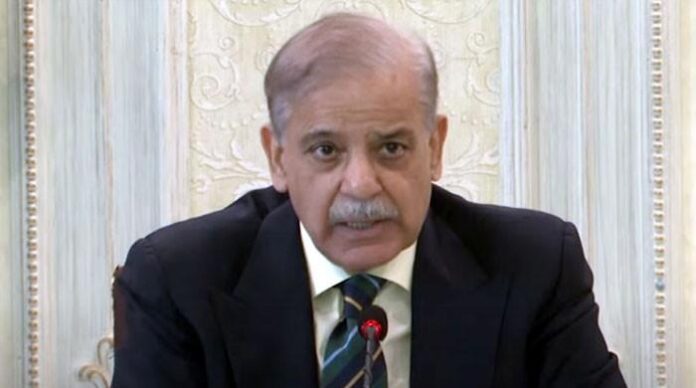- PM says Pakistan avoided default through IMF deal efforts.
- Climate change caused $30bn loss in 2022 floods: premier.
- “FBR digitised, revenue jumps from Rs12bn to Rs50bn.”
ISLAMABAD: Prime Minister Shehbaz Sharif on Saturday reaffirmed his government’s commitment to achieving economic prosperity through long-overdue structural reforms, institutional changes, and a renewed focus on merit-based governance.
“The road is very challenging as there were long overdue reforms, and the structural changes had not taken place in the last many decades,” he said while addressing a group of Pakistani students, who are getting education in the world leading educational institutes and selected for government’s internship summer scholars programme of Uraan Pakistan.
The prime minister stressed that Pakistan had to undertake these overdue long structural changes, through untiring and long efforts.
At the outset, he pointed out that when the Pakistan Muslim League-Nawaz (PML-N) took charge of the government during 2023, Pakistan was facing a serious threat of default and their fate was hanging in balance.
“The majority viewed that Pakistan would go into default while the minority thought that we will escape this disaster,” he said, adding that he held marathon discussions with the International Monetary Fund (IMF) managing director and assured that Pakistan would not run into default and achieve the IMF programme.
The prime minister said that at that period, the economy was in bad shape, with galloping inflation touching 38% while policy rate was hovering at 22.5%. The business atmosphere in the country was very skeptical.
The premier, in his remarks, further said that they had the huge burden and onus to march in unison and work with sincerity of purpose to change the situation.
He also referred to reforms and digitisation of Federal Board of Revenue (FBR) and said that they had shown doors to the corrupt people without being influenced.
To weed out corruption in FBR, he was very clear in his mind and took decisions which had never taken without heeding to a culture of any ‘Sifarish’, he added.
The prime minister said that previously, digitisation process in FBR was only confined to papers as no practical step was taken and blamed the corrupt and shrewd elements for hoodwinking the system.
He said that it did not mean that there was dearth of hardworking and honest bureaucrats who were not given the chance, adding that they had brought forth the best people in FBR, including its chairman, and hired expert consultants.
Now, he said digitisation was the hallmark of FBR, where working had been converted from papers to multiple initiatives, including AI, and faceless interaction.
Through enforcement of these measures, the revenue collection had risen from Rs12 billion to more than 50 billion rupees in one year, showing massive tax evasion in one sector alone, he maintained.
“We have a long and thorny journey and facing mountain like impediments, but I assure that we will not shy away from discharging our duties in the service of the nation.”
Responding to a student’s query, he said that due to climate change, Pakistan suffered a lot during 2022 floods, with economy faced $30 billion losses, despite the fact that the country did not contribute a friction of percent in the global greenhouse effects.
The prime minister, responding to a question, said that during the month of May, Pakistan faced India’s uncalled aggression in the backdrop of Pahalgam incident.
He said that he had offered a straight proposal to India to let this matter be investigated by the international bodies, but India never commented on this proposal.
As result of Indian aggression, 55 Pakistanis were martyred and they responded in self defence by downing six Indian planes, he said, adding while on May 9 and 10, after India’s attack, Pakistan responded with full might and taught the enemy a lesson.
The prime minister praised the armed forces for showing their professional capabilities and courage, saying Pakistan won the conventional war.
He maintained that Pakistan’s nuclear programme was only meant for the peaceful purposes and for the self-defense.

